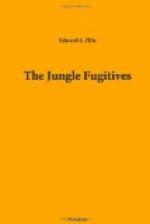“Great Allah! He has been bitten!” exclaimed the horrified Mustad, almost knocking the young woman off her feet in his rush towards his master; but one of the others had perceived the monstrous cobra, and, clubbing his gun, he beat the life out of it with one blow, before it could glide away into the jungle. It looked as if this part of the country was specially pestered by the dreadful reptiles.
Almos knew he was doomed. All hope had vanished, and, dropping to the ground, he bared his bronzed ankle, looked at the tiny points where the horrible poison had been injected into his system, and then, like the fatalist be was, he calmly folded his arms and waited for the last moment that was rushing upon him. He was a faithful follower of the Prophet and knew how to meet the inevitable that awaits us all. His companions, awed and silent, stood around, unable to say or do anything that could give him comfort. Miss Marlowe, after walking part way to the group, paused and looked at them and at her father, who was hurrying to the spot. She wondered that Almos had permitted the killing of the cobra, since the snake is looked upon as sacred in India, and few natives can be induced to injure one. The Ghoojurs probably slew it in the flurry of the moment.
Dr. Marlowe had heard the cry and noted the excitement, but did not suspect the cause until he drew near the spot. Then Mustad, familiar with the skill of the medical man, beckoned to him and said:
“Make haste, great sahib, Almos has been bitten by a snake; no one can save him but you.”
The stricken chief, from his seat on the ground, looked up in the face of the white man, of whose wonderful skill he had received proof in his own self. The countenance of the Ghoojur was of ashen hue, and the yearning expression of his eyes told of the hope that had been kindled within his breast.
Now that the physician had dropped into what may be called his professional character, he was himself again. He set down the caba containing his instruments, and medicaments, adjusted his glasses, and stooping over, intently studied the wound made by the cobra. Then he drew out his watch, as if he were timing the pulse beats of a patient.
“It is one minute and a half since you were bitten,” he said, still holding the timepiece in his hand, but looking into the face of Almos; “in three more minutes and a half no power but Allah can save you.”
Catching the full meaning of these words, the Ghoojur leader quivered with suddenly renewed hope.
“Can you save me?” he asked in Hindustani.
“I have in there,” replied the physician, tapping his caba with his long forefinger, “that which will render the bite of the snake as harmless as the peck of a bird that flies in the air, but barely three minutes remain in which to apply it.”
“Then I beseech you, do not wait,” said the eager Almos, shoving his foot towards the doctor; “great is the English doctor; be quick; why do you tarry?”




